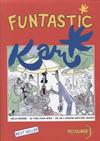
The Three Signs of a Miserable Job: A Fable for Managers (And Their Employees)
1 journaler for this copy...
An okay business fable...
Amazon Review
A Contemporary Business Fable of Compelling Importance, 3 Sep 2007
By Robert Morris (Dallas, Texas) - See all my reviews
According to research conducted by The Gallup organization, only 25% of employees are engaged in their jobs, 55% of them are just going through the motions, and 20% of them are working against their employers' interests. What's going on? In the Introduction to his latest book, Patrick Lencioni acknowledges what he characterizes as "Sunday Blues [:] those awful feelings of dread and depression that many people get toward the end of their weekend as they contemplate going back to work the next day...What was particularly troubling for me then [when he had such feelings] was not just that I dreaded going to work, but that I felt like I should have enjoyed what I was doing...That's when I decided that the Sunday Blues just didn't make any sense" and he resolved to "figure out what [personal fulfillment in work] was so I could help put an end to the senseless tragedy of job misery, both for myself and for others."
In this book, Lencioni shares what he then learned during his journey of discovery.
As is his custom, he uses the business fable genre to introduce and develop his insights. His narrative has a cast of characters, a plot, crisp dialog, various crises and conflicts, and eventually a plausible climax. Here's the situation as the narrative begins. Brian Bailey is the CEO of JMJ Fitness Machines. After fifteen years under his leadership, JMJ has become the number three, at times two "player" in its industry. "With no debt, a well-respected brand, and plenty of cash in the bank, there was no reason to suspect that the privately held company was in danger. And then one day it happened"....
The balance of the book proceeds on two separate but interdependent levels: Brian's personal and professional development after JMJ's acquisition by a competitor, and, the impact of that acquisition on JMJ's culture. Both he and the company proceed through what Warren Bennis and Robert Thomas have characterized as a "crucible": an especially severe trial or ordeal during which those involved experience tremendous pressure that either "makes them" stronger and wiser or "breaks them" in terms of their ability and/or willingness to prevail. The details of Brian's "crucible" as well as those of JMJ's are best revealed within the book's narrative. It would also be a disservice to both Lencioni and to those who read this commentary for me to reveal the meaning and significance of the book's title.
However, I feel comfortable explaining why I think so highly of this book. Here are three of several reasons. First, Lencioni is a master storyteller. He makes brilliant use of the components of the classic fable, in this instance (as in his earlier books) creating a contemporary business situation in which human beings are involved, rather than anthropomorphic animals as George Orwell, E.B. White, and Stephen Denning do. Brian Bailey and others are anchored in sometimes "miserable" real-world situations. Their responses to these situations are portrayed with authentic drama, not with a business theorist's facile didacticism. Second, he achieves his objective of determining (both for himself and for his reader) how personal fulfillment can be achieved in a workplace. There are indeed important lessons to be learned, both by managers and by those for whom they are responsible. Finally, Lencioni entertains his reader with appropriate wit without at any time trivializing the seriousness of the issues he addresses. This is a fable, not a sermon.
Those who share my high regard for Patrick Lencioni's latest book are urged to check out his earlier works as well as The New American Workplace co-authored by James O'Toole and Edward E. Lawler, Paul Spiegelman's Why is Everyone Smiling?: The Secret Behind Passion, Productivity, and Profit, and Michael Lee Stallard's Fired Up or Burned Out: How to Reignite Your Team's Passion, Creativity, and Productivity.
Amazon Review
A Contemporary Business Fable of Compelling Importance, 3 Sep 2007
By Robert Morris (Dallas, Texas) - See all my reviews
According to research conducted by The Gallup organization, only 25% of employees are engaged in their jobs, 55% of them are just going through the motions, and 20% of them are working against their employers' interests. What's going on? In the Introduction to his latest book, Patrick Lencioni acknowledges what he characterizes as "Sunday Blues [:] those awful feelings of dread and depression that many people get toward the end of their weekend as they contemplate going back to work the next day...What was particularly troubling for me then [when he had such feelings] was not just that I dreaded going to work, but that I felt like I should have enjoyed what I was doing...That's when I decided that the Sunday Blues just didn't make any sense" and he resolved to "figure out what [personal fulfillment in work] was so I could help put an end to the senseless tragedy of job misery, both for myself and for others."
In this book, Lencioni shares what he then learned during his journey of discovery.
As is his custom, he uses the business fable genre to introduce and develop his insights. His narrative has a cast of characters, a plot, crisp dialog, various crises and conflicts, and eventually a plausible climax. Here's the situation as the narrative begins. Brian Bailey is the CEO of JMJ Fitness Machines. After fifteen years under his leadership, JMJ has become the number three, at times two "player" in its industry. "With no debt, a well-respected brand, and plenty of cash in the bank, there was no reason to suspect that the privately held company was in danger. And then one day it happened"....
The balance of the book proceeds on two separate but interdependent levels: Brian's personal and professional development after JMJ's acquisition by a competitor, and, the impact of that acquisition on JMJ's culture. Both he and the company proceed through what Warren Bennis and Robert Thomas have characterized as a "crucible": an especially severe trial or ordeal during which those involved experience tremendous pressure that either "makes them" stronger and wiser or "breaks them" in terms of their ability and/or willingness to prevail. The details of Brian's "crucible" as well as those of JMJ's are best revealed within the book's narrative. It would also be a disservice to both Lencioni and to those who read this commentary for me to reveal the meaning and significance of the book's title.
However, I feel comfortable explaining why I think so highly of this book. Here are three of several reasons. First, Lencioni is a master storyteller. He makes brilliant use of the components of the classic fable, in this instance (as in his earlier books) creating a contemporary business situation in which human beings are involved, rather than anthropomorphic animals as George Orwell, E.B. White, and Stephen Denning do. Brian Bailey and others are anchored in sometimes "miserable" real-world situations. Their responses to these situations are portrayed with authentic drama, not with a business theorist's facile didacticism. Second, he achieves his objective of determining (both for himself and for his reader) how personal fulfillment can be achieved in a workplace. There are indeed important lessons to be learned, both by managers and by those for whom they are responsible. Finally, Lencioni entertains his reader with appropriate wit without at any time trivializing the seriousness of the issues he addresses. This is a fable, not a sermon.
Those who share my high regard for Patrick Lencioni's latest book are urged to check out his earlier works as well as The New American Workplace co-authored by James O'Toole and Edward E. Lawler, Paul Spiegelman's Why is Everyone Smiling?: The Secret Behind Passion, Productivity, and Profit, and Michael Lee Stallard's Fired Up or Burned Out: How to Reignite Your Team's Passion, Creativity, and Productivity.








